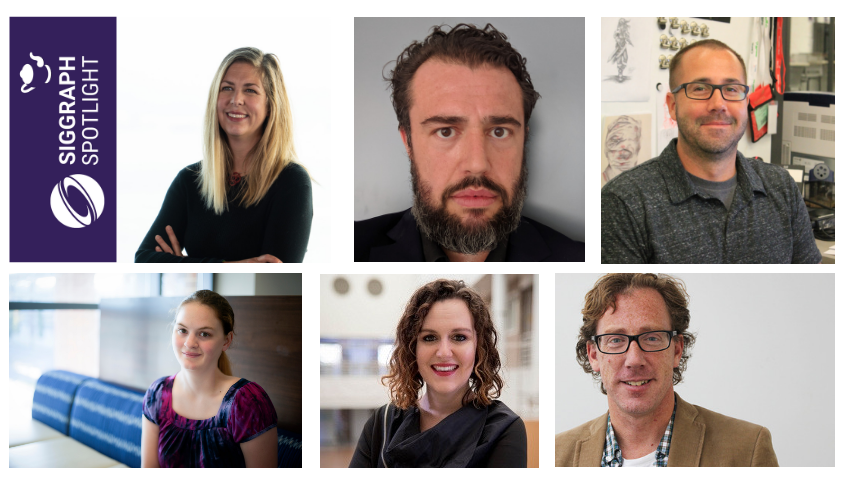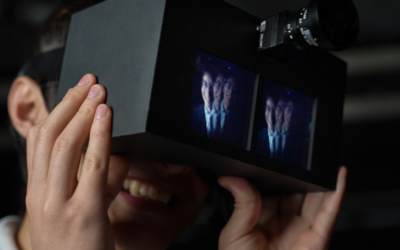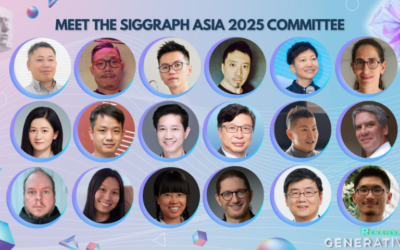Clockwise from top left: Courtney Starrett, Pietro Lungaro, Marc Petz, Konrad Tollmar, Rachel Dickey, and Natalie Rountree.
SIGGRAPH Spotlight welcomes SIGGRAPH 2019 Emerging Technologies Chair Courtney Starrett (associate professor, Texas A&M University, Department of Visualization) to lead a discussion on adaptive technology, including new research and practical applications, as well as participants’ inspiration and personal connections to this focus area. Courtney is joined by SIGGRAPH 2019 Adaptive Technology Co-Chair Natalie Rountree, Konrad Tollmar (associate professor, KTH Royal Institute of Technology), Pietro Lungaro (researcher, KTH East Jump Royal Institute of Technology), Marc Petz (3D animation and game design instructor, Kent Career Tech Center), and Rachel Dickey (assistant professor of architecture, University of North Carolina – Charlotte).
Make sure you don’t miss a single episode of SIGGRAPH Spotlight! Subscribe to the show on Apple Podcasts (iTunes), Spotify, Stitcher, SoundCloud, iHeartRadio, or Google Play Music.
Courtney Starrett is an associate professor at Texas A&M University in the Department of Visualization. Her work is included in permanent collections at the Mint Museum Uptown in Charlotte, NC and Center for Contemporary Art & Culture at Pacific Northwest College of Art in Portland, OR and has been published in the journal Leonardo (MIT Press), Metalsmith Magazine, How Design Magazine, Taiwan Craft Magazine, Art Jewelry Magazine, Cast: Art and Objects, 500 Necklaces, and 500 Plastic Jewelry Objects. Starrett’s current creative research investigates the use of conceptually relevant data to create forms utilizing computer programming and digital design/fabrication processes in combination with handwork. Starrett has served as an ACM SIGGRAPH volunteer for more than a decade, including the SIGGRAPH 2019 Emerging Technologies chair.
Natalie Rountree is a disability champion, MTSU graduate, and longtime SIGGRAPH volunteer. She served as a Student Volunteer Team Leader for three years, and proposed the Adaptive Technology focus area at the conference, which highlights assistive technology content. Natalie serves on the ACM SIGGRAPH Diversity sub-committee, and promotes continued efforts to make SIGGRAPH accessible to all.
Pietro Lungaro, Ph.D., is a research scientist at the Royal Institute of Technology (KTH) in Stockholm, Sweden. He has invented, designed and developed a number of innovative technologies in several application areas within communication systems and human-machine interfaces. His research interests focus on exploiting user and service context information to optimize the provision of future media in mobile networks, including end-to-end optimization of mobile communication systems, virtual and augmented reality solutions and platforms, eye-tracking technologies and applications, Internet-of-Things (IoT) and Internet-of-Light (IoL) services, applications and platforms. He is the author of several journal and conference papers in the areas of Quality of Experience (QoE), user-centric solutions and algorithms for enabling the provision of VR/MR/AR services in future 5G networks and novel interfaces between humans and AI-controlled machines.
Konrad Tollmar is an associate professor at KTH. His main research interest is in mobile computing, computer vision and graphics, and how interactive technologies becomes a part of our everyday practice and life. Tollmar leads the Mobile Service Lab at KTH, and is the program director for KTH and EIT Digital master program in ICT Innovation. Prior to this, he worked at Ingvar Kamprad Design Centre – Lund University, CSAIL – MIT, and The Smart Studio at Interactive Institute.
Marc Petz is a 3D Animation and Game Design instructor at the Kent Career Tech Center in Grand Rapids, Michigan. He received his bachelor’s in 3D animation and game design from Ferris State University in 2009, and his master’s degree in business administration from Cornerstone University in 2014.
Rachel Dickey is an assistant professor of architecture at University of North Carolina Charlotte. She holds a Masters of Design Studies with a concentration in technology from the Harvard University Graduate School of Design, and graduate and undergraduate degrees in architecture from Georgia Institute of Technology. Her research explores the use of machines and tools in design not only in terms of material manipulation, but also as instruments which affect people and their environments. As a teacher of undergraduate and graduate architecture studios and computational design, her courses investigate technological approaches which emphasize design agency in architecture.



